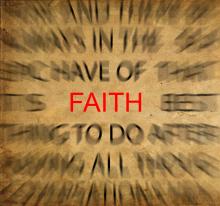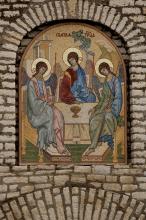Living the Word

INVITATIONS COME. Yet an expressed desire for your presence does not guarantee your willingness to show up. Invitations require a response. Some responses indicate significant commitment beyond “just showing up.” A summons may first entail an RSVP indicating a commitment to actually take an active part in the opportunity.
Such is the case for the people of God. Invitations arrived inviting God’s people to be witnesses to the power and presence of a particular God and to become a people who practice justice and favor kindness—peculiar expectations for an ancient culture, for any culture. A requirement of this sort unsettles the status quo of cultural mores where religion represents polytheistic attributions to a type of celestial Santa Claus or divine ATM, or where religion has been privatized—set aside from public prophetic witness to meditative reflection in the privacy of our own homes with occasional festive gatherings. Such genie-worship and privatization results in a deafening silence among the people of God. As Pope Francis put it recently, “a privatized lifestyle can lead Christians to take refuge in some false forms of spirituality.”
The promises that God calls us to are promises that Michael Frost, in Exiles, calls dangerous. They accompany dangerous memories that make a dangerous critique of society.
Over the next five weeks, the invitations extended in these texts indicate more than increasing the head count of seekers of spirituality. They require a response that signifies a commitment to participating in a community whose primary purpose is to expose the dangerous promise of God.

EXECUTE: TO ENACT OR DO. Having grown up in inner-city Chicago, I have fond memories of red fire hydrants, swinging jump ropes, and church robes. During summer, the fire department would open the hydrants. Parents granted the petitions of children to run through the streams of water, soaking our clothes and cooling our backs. And while I never achieved the rhythmic agility to jump Double Dutch, I loved to recite the rhymes, which eventually helped me gain a verbal dexterity like that of my pastor. I wanted one day to have a robe like hers—one that signaled that the words I spoke revealed the reign of God.
Turn the clock back. Some children would hold very different memories of fire hydrants, ropes, and robes. In Birmingham, Ala., in1963, the force of the water injured petitioners for freedom. During the American Revolution, a Virginia justice of the peace named Charles Lynch ordered extralegal punishment for Loyalists to the Crown. The swinging rope became the tool of mob violence. And the “hooded ones” continue to use the label of “Christian” to make a mockery of the vestments of clergy.
Fire hydrants. Ropes. Robes. Execute: to eliminate or kill. Meaning conveyed to the hearer may not at all resemble the intention of the speaker. Often communication requires suspension of what we think in order to listen to the context from which the speaker shares. Reading is no easier a task. Sometimes the same letters forming the same word present entirely different meanings. Justice executed. What does it mean?
The context for the next four weeks exposes what the Lord’s justice requires.

A NEW CALENDAR YEAR marks the end of the Christmas season and a shift to the season of Epiphany that spotlights the reality of the Incarnation. In sync with our personal promises to discontinue bad habits in favor of better practices, the lectionary readings capture familiar expressions of vocational clarity and ministerial frustration. The season is a mosaic of self-examination peppered with moments of great light penetrating the darkest despair. Whether ancient Israel (living in exile in the sixth century B.C.E.), the followers of Jesus (in the first century C.E.), or 21st century seekers of spirituality without religion, the description is the same: The disenfranchised, disappointed, and divided discover a glimpse of the reign of God.
Read these texts as snippets of ancient social media: status updates of a prophet, blogs about the ministry of Jesus, and PDF files about early church practices. Each exposes the light of God pushing into the darkness of human existence: frustrated ministers, radical promises of forgiveness, reports of flourishing charismatic leaders, stalemated efforts due to divided affiliations, petitions for lawmakers to practice impartiality, and the death of one imprisoned on suspicious testimony. Familiar, jarring, and too often tamed, these texts deserve at least the attention afforded public policy debates and celebrity rumors.
A close reading of the text does not lend safety by avoiding the prophet, ignoring John’s message, or disputing baptism rituals. Every baptized believer is called to arise and live as if the kingdom of God has come.

A PROFOUND SENSE of expectation launches a new year. As the season of Advent commences the Christian year, just weeks before the turn of the calendar year, familiar biblical stories invite us to begin again by glimpsing the coming reign of God. Weekly worshippers and annual attendees gather for the season premiere of the greatest story ever told. A promise. A vision. A hope. Great expectation.
The ancient prophet, psalm, gospel, and epistle together extend to the contemporary preacher words of unflinching hope that emerge fresh from the rubble of turmoil, trial, and tribulation of every God-seeking generation. Today’s words of hope must also descend like the savory aroma of a holiday meal, promising solace to the harmed, heartbroken, and hindered.
Familiarity with the Advent and Christmas narratives may leave us unaware of the radical expectation and potential impact that reciting these events can bring. These readings offer an arresting narrative of divine presence inaugurating an unprecedented commonwealth from among the divided nation. The vision makes no sense if it does not offer an alternative to the existing promises of “life, liberty, and the pursuit of happiness.” The narrative challenges us to understand that our celebration of the birth of Jesus is not shiny lights or a musical presentation. It anticipates the arrival of goodness signaling an end to corruption and gloom. This global holiday extends the drama narrated in Christian scripture as each generation must wrestle again with the contemporary relevance of the birth of Jesus.

THE CELEBRATED PHILOSOPHER Ludwig Wittgenstein used to speak—disapprovingly—of “language going on holiday.” For example, sportswriters often free language from the drudgery of everyday common usage to let it spread its wings in glorious hyperbole about their favorite teams.
Our biblical heritage gives us examples that are much deeper. When we read the prophets especially, we hear language liberated from the constraints of the everyday to give it a sacred vacation, a true “holy-day,” so that it can return to us reinvigorated. We hear them sending language on an adventure holiday into the realm of God’s future. When they receive the words back, the prophets find themselves recounting visions of a new world that God has in store.
Eschatological language that has been to the future and back exerts a powerful authority over us. In this month’s scriptures we experience that authority again in Isaiah’s unforgettable oracles about the holy mountain on which no one shall ever again hurt or destroy. We shall see, with our mind’s eye, the rising of the sun of righteousness with healing in its wings. We shall hear Jesus speaking of the life waiting for the children of the resurrection. The church’s year ends by inviting us to enter under the authority of the coming kingdom, to become fluent in its strange language of hope, harmony, and ultimate reunion with the Holy One who has reconciled all creation through the cross and resurrection.

JEREMIAH IS OUR uncomfortable and discomfiting companion this month. He is a vehemently emotional man of God. Far from struggling to bring his emotion under control, he instead prays for more raw grief and anger. He knows that even his current rage and tears in no way match the scale of devastation wreaked by unfaithfulness to God’s covenant. “For the hurt of my poor people I am hurt, I mourn, and dismay has taken hold of me. Is there no balm in Gilead? Is there no physician there? Why then has the health of my poor people not been restored? O that my head were a spring of water, and my eyes a fountain of tears, so that I might weep day and night for the slain of my poor people!” (8:21 - 9:1). To be a prophet is to risk letting our hearts resonate with the feelings of God. Jeremiah might help us discern whether our own witness for justice has turned into something too rational, measured, even routine. How do we re-engage our hearts and derive our passion from God’s divine passion?
Luke’s deep concern to show Jesus’ prophesying against the toxicity of Mammon, the power games of the wealthy, is ablaze in the gospel readings. Perhaps those who read them to us in church should preface them with a warning along the lines of Bette Davis’ famous quip in All About Eve: “Fasten your seatbelts. It’s going to be a bumpy night!”

WHICH SCRIPTURES WILL our biases tempt us to sidestep this month? Perhaps 2 Timothy? Not usually the favorite of radicals. Whether actually written by Paul just before his death or worked up later by followers, the letter has a certain poignancy, suggesting the waning of Christianity’s pioneer phase. The church is in for the long haul. Its faith needs to find forms that can be transmitted across generations. It needs patient leadership that will be consistent in the face of inauthentic mutations of the gospel, religious imposters, and the distraction of futile controversies—hence the emphasis on sound teaching, the internalized treasure of the creed.
Let’s honor this recognition within scripture itself that the gospel needs institutions. The church must even risk banality in some of its teaching practices. A great interpreter of the Christian mystical tradition, Friedrich von Hügel, invites us to respect the way radical teachings have to be given forms that can be handled by regular folks, not geniuses. “Is there not a pathetic instruction in watching the insertion of the copper alloy into the pure gold ... that is, a metal sufficiently resistant to the clumsy handling of the multitude to be able to persist in the transmission of a value, and indeed a precise value, even though it be not the highest. There is surely a pathos here most thoroughly characteristic of the abiding limitations and homely needs of our poor humanity.”

THROUGH THE WRITER of the letter to the Hebrews we will be learning this month how the spiritual environment that upholds us as agents of God’s reign is richly, magnificently peopled. Entering into the spirit of this letter is like finding oneself worshiping in a great Byzantine church, in which the walls are blazing with frescoes and mosaics depicting the history of salvation and the saints in all their glorious variety. The writer extols the lineage of witnesses to God down the ages. We are asked to recognize them all as a crowd of supporters cheering us on. The writer insists that we live in vibrant awareness of the great and all-embracing community that God is forging. “But you have come to Mount Zion and to the city of the living God, the heavenly Jerusalem, and to innumerable angels in festal gathering, and to the assembly of the firstborn who are enrolled in heaven, and to God the judge of all, and to the spirits of the righteous made perfect, and to Jesus, the mediator of a new covenant” (Hebrews 12:22-24).
This is the antithesis of the bizarre theory that “religion is what the individual does with his own solitariness,” as the philosopher Alfred North Whitehead claimed. God is communion, as we try to express it in the doctrine of the Trinity. Life is interrelatedness. The baptismal creed of the church commits us to belief in the communion of saints because God recruits us for the struggle to build, sustain, and nurture community-where-God-reigns here on earth, as it is in heaven.

AS THE SEAONS after Pentecost unfolds, we might think that summer calls for a kind of “church lite” in which we shouldn’t expect much to happen. With the dramatic commemorations behind us, the scriptures seem miscellaneous. But this season has its own purpose of soaking in the Word. Just let go of dependence on drama.
Our month’s reading opens in 2 Kings 5 with the healing of Naaman, the distinguished Aramean general, told with a dry humor that Jesus appreciated, since he specifically mentions it (Luke 4:27) in his teaching about faith found outside the bounds of Israel. At first Naaman’s dignity is offended by Elisha not bothering even to meet him in person. His pride receives a further blow in the ludicrous banality of the prescription that Elisha’s assistant passes on: “Go, and wash in the Jordan seven times” (verse 10). Naaman’s fuming about the short shrift he got, and the humiliation of being prescribed a business of splashing in a local stream, are quite comic. Paddling in the Jordan indeed—a ditch in comparison to the storied rivers of Damascus! Smiling, we recognize the storyteller’s shrewd knowledge of psychology. The tale has a good ending. Finally getting off his high horse, Naaman allows his aide to persuade him to try the simple bathing routine. Over time his skin is healed and rejuvenated.
The church behaves like that shrewd aide when it invites us to trust in the power of hearing the scriptures again and again, however overfamiliar some of them seem, and others obscure.

THE SAGA OF Elijah that we are following in 1 and 2 Kings culminates in a poignant parting as the prophet prepares to be taken up into heaven. His disciple, Elisha, makes a final all-or-nothing request: “Please let me inherit a double share of your spirit” (2 Kings 2:9). Elijah states a condition for the fulfillment of Elisha’s prayer: “You have asked a hard thing; yet, if you see me as I am being taken from you, it will be granted you; if not, it will not” (2:10). It is as if Elisha has to look unblinkingly into the reality of their separation. If he is to inherit the prophetic mantle and spirit of his teacher, he must claim the vocation in its entirety. He is now to be the prophet.
The story is an uncanny pointer to the truth that John the Evangelist highlights in Jesus’ last words to his disciples: “I tell you the truth: It is to your advantage that I go away, for if I do not go away, the Advocate will not come to you ...” (16:7). John even echoes the “double spirit” theme in 14:12, when he has Jesus assure us that our prophetic endeavors will be more abundant and powerful than Jesus’ own!
The season following Pentecost helps us realize that we are the prophets now, vested with the mandate and endowed with the gifts for enacting the good news of liberation.

I WAS BROUGHT UP up on stories of my family's emigration to Russia from England in the 1850s and of the three generations we lived there and intermarried. My grandparents fled the upheavals of revolution in 1917, returning to England. Having drunk deeply from the springs of Russian spirituality, it is second nature to me to hear the scriptures with Russian ears. As Eastertide culminates at Pentecost (rounded out in the wonderful coda of Trinity Sunday), I find myself murmuring as a mantra the great injunction of St. Sergius of Radonezh, "Beholding the unity of Holy Trinity, to overcome the hateful disunity of this world!" The doctrine of the Trinity is no mere antiquity, but a beacon pointing to the future that God desires for the world. In the Trinity, "hateful disunity" can be transformed into life-in-communion; our life together as human beings incarnating our identity as ones made into the image and likeness of God. I will find myself doodling on my notepad the provocative claim of the Russian lay theologian Nikolai Fedorov: "Our social program is the dogma of the Trinity."
Taking in again the Trinitarian grammar of our prayer and faith, I will find myself reinvigorated for the task of forging a spirituality that, as a great Anglican priest Alan Ecclestone wrote, "takes its Trinitarian imagery more seriously than ever before, relating the creativity, the humanizing, and the unification of [humankind] in one growing experience of mutual love." This from a man who was a passionate political activist writing from the thick of gritty urban politics, not from an ivory tower.

HOW SHALL WE engage with scripture through all 50 days of Easter? There are clues in the haunting story of Jesus' appearance beside the sea of Tiberius. After Easter Day many of us are ready to let things quickly revert to normal. It is, strangely, both reassuring and uncomfortable to hear that those disciples, whose business had been fishing, wanted to get back to their boats so promptly after the horrors and wonders they had witnessed in Jerusalem.
Jesus is waiting for them by the shore with breakfast already cooking. All is ready, yet he wants them to bring some of what they haul up in their nets, so he can include samples of their own catch in the menu. And what a catch it was!
Easter is our time to experience the grace that is always ahead of our game and is underway for us before we are ready. Yet grace does not exclude what we bring to the table. Grace expects and includes the work of our hands, the weavings of our imaginations, and the gifts of our unique experiences. In one sense, Eastertide is more truly a season of repentance than is Lent. One thing we might need to repent of is our passivity—those times when we expect God to hand us on a plate the meaning we are hungry for. We need to bring our own bits to the cooking fire if we are to really eat with Jesus. It is part of the mix of grace that we must participate, not just receive.

"THIS IS THE LORD'S DOING; it is marvelous in our eyes. On this day the Lord has acted; we will rejoice in and be glad in it." We will be singing these words from Psalm 118 on Easter Sunday, and they pinpoint a critical issue in our religious witness. Do we have the courage to have God be the subject of sentences, or is God usually the object of our reflections? There is a difference. Do we make ourselves really the subject of our sentences, so that religion is about our doings and ideas and needs? The scriptures insistently talk about what God did and is doing and will do in Christ, the crucified and risen one. Our role is to rejoice in the way God acts upon us, with us, around us, behind us, above us, ahead of us, through us.
Praise is the litmus test. If God is experienced as the one who is acting, the impulse to praise is inevitable. This may help us understand the importance of the psalms in our lectionary. They aren't mere supplementary devotions. As supreme words of praise, they test the authenticity of our reactions to the good news. They test and they can train. The psalter is the church's manual to help practice the "scales of rejoicing," to borrow a phrase from W.H. Auden's "Christmas Oratorio." A phrase on Auden's tombstone comes back to me: "In the prison of his days / Teach the free man how to praise." The psalms come to life only where this teaching is taken seriously.

"EVEN IF I OWNED Picasso's 'Guernica,' I could not hang it on a wall in my house, and although I own a recording of the Solti Chicago Symphony performance of Stravinsky's 'Rite of Spring,' I play it only rarely. One cannot live every day on the boundary of human existence in the world, and yet it is to this boundary that one is constantly brought by the parables of Jesus." So wrote a great New Testament scholar, Norman Perrin, in his book Jesus and the Language of the Kingdom. I often think about his frankness as I prepare for the transition between Epiphany and Lent. We must soften and make bearable the intensity of the scriptural story to face it every week in church. We can't dive to the depths every single week, and we are right to keep our child-friendliness going.
But we need to risk depth and passion, or run the danger of making the gospel seem boring and predictable. Our churchly betrayal of God lies in our willingness to make the Word seem banal. So perhaps the thing we need to give up for Lent is our avoidance of depth. The scriptures this month will speak to us of faith as the experience of being stressed almost to a breaking point. They will plumb the depths of divine frustration and disappointment. We must clear a space for these wounding and thrilling themes and suspend our strategies for making worship palatable and safe.

"NO ONE SPEAKING by the Spirit of God ever says, 'Let Jesus be cursed!'" insists Paul in his first letter to Corinth (12:3). Driving through Corinth not long ago, I found myself musing about the extraordinary spirituality that had grown up in the church he was trying to straighten out. Apparently, ecstatic worshippers caught up in charismatic excitement on the Lord's day were actually known to blurt out these shocking words: "Anathema, Jesus!" In a very brief period, the church there had come up with a mutation of the gospel in which only the cosmic, exalted savior, known through speaking in tongues and exciting miracles, mattered. The earthly person of Jesus of Nazareth had been a mere husk to be shucked off, they said. Only the Spirit-giving celestial Lord mattered. Jesus be damned! His teachings back in Galilee signified nothing; now they could concentrate on the prophecies that came hot and strong from heaven through the church's prophets—a belief that left plenty of room for all sorts of wild ethical "experiments," to put it mildly.
Well, no one actually utters "Let Jesus be cursed" out loud anymore, but, in a more subtle way, how prevalent is a pseudo-spirituality that relativizes the radical teaching of the reign of God! These readings bring us back under the authority of Jesus' witness in Galilee—and the reality that there is no Spirit, and no spirituality, except the one we receive as the driving energy to bring good news to the poor.

“TAKE OFF THE garment of your sorrow and affliction, O Jerusalem, and put on forever the beauty of the glory from God. Put on the robe of the righteousness that comes from God; put on your head the diadem of the glory of the Everlasting” (Baruch 5:1-2). We might occasionally hear in church a prayer that makes passing use of the phrase “the beauty of holiness,” but it can’t be claimed that we are helped very often to feel that the contagious goodness of God is absolutely lovely, alluring, and attractive. We are called to be beautiful human beings. Christians who are deeply serious about social justice, who carry the burden of the world’s brokenness in their hearts, who are committed to political dissent, probably need this reminder most of all. We can hardly be agents of change if our faces are disfigured by disgust and anger.
Advent may be an especially important time to listen carefully for the Word who summons us to be walking sacraments of God’s radiant beauty. Paul will speak to us about having joy in one another and clothing ourselves in love. We are meant to fill our imaginations in these weeks with the sight of Mary in the radiance of her final days of pregnancy. Doesn’t her beauty lend all the more power to her proclamation, “[God my savior] has brought down the powerful from their thrones, and lifted up the lowly; has filled the hungry with good things, and the rich sent away empty” (Luke 1:52-53)?

IT WOULD BE strange if any segment of the liturgical year left out the theme of migration. The Bible is riddled from end to end with the journeys of nomads, pilgrims, exiles, returning exiles, and the risky intrusions of strangers across boundaries erected to deter them.
This season’s poster child for divinely inspired mobility is the lovely figure of the Moabite “alien” Ruth, who chooses to leave her own country and accompany her beloved Jewish mother-in-law when she returns as a widow to her native Judea. Ruth’s story is romantic, even erotic, as she daringly slips into the arms of Boaz during the sexually charged siesta at the threshing floor. But our readings are no mere novelette. Scripture shows how much hinged on her pluck and her allure. Her great-grandson will be David, and her descendant Jesus the Messiah!
“Where would we be without immigrants?” is one of the many questions between the lines of the scriptures. The Bible has lots to say to us about the divine impulse active in migrations, and the opening of the heart to “strangers within our gates”—things guaranteed to alarm defensive nationalists of every stripe.
I remember the deep spiritual emotion that caught us all up in Boston’s Faneuil Hall during my naturalization ceremony—Cambodian refugees, Vietnamese grandmothers, Salvadoran families, and all the rest of us. I think of the migration of my own great-grandparents to Russia, and the adventures that have scattered my own family from New Zealand to Mexico. How God revels in mixing us all up!

OUR READINGS FROM Hebrews yield one of the most intense images for the experience of being addressed by the Holy One: “Indeed the word of God is living and active, sharper than any two-edged sword, piercing until it divides soul from spirit, joints from marrow: It is able to judge the thoughts and intentions of the heart. And before God no creature is hidden, but all are naked and laid bare to the eyes of the one to whom we must render an account” (12: 4-16). Those who passionately feel convicted by the Word to work for the transformation of the broken and unjust structures of society need to witness to our own continuous religious experience of being penetrated, judged, and aroused in our living conversation through scripture. Otherwise people might mistakenly imagine that this strong language somehow belongs to those who extol the inerrant authority of scripture while finding in it support for reactionary values.
A prison chaplain gave a new inmate a Bible. Asked later what he made of it, the prisoner replied simply, “I didn’t read the book; it read me.” And this isn’t an occult experience. We allow ourselves to be addressed whenever we drop those filters that screen out impressions that threaten upheaval for the status quo. A critic once said of Austrian artist Oscar Kokoschka’s drawings, “We don’t look at them, they look at us, searching, probing, and testing us,” and these words come back to me often when I open the Bible for meditation, and drop my defenses.

Reflections on the Common Lectionary, Cycle B
THE MOTTO OF RADICAL FAITH always is “now—or never.” If we can’t find divine grace reaching out to us in the here and now, just where we are, then we will never find it. We won’t find it by merely dwelling on the stories and legends of divine interventions in the past. For centuries, the fourth gospel has made people uneasy because it heightens the tension between those who think of religion as loyalty to what has been handed down for us to repeat and those who are prepared to see God right before them and with them now. This month we are asked to immerse ourselves in the very tense sixth chapter of John’s gospel, in which Jesus provokes bafflement and resentment by daring to appropriate to himself the mystique of the manna, the bread from heaven given by God to sustain the Israelites on their journey through the wilderness.
Everyone knew what the bread from heaven was. It was something miraculous embedded in legends of yesteryear, wasn’t it? Quite apart from being scandalized by Jesus’ apparent delusional egomania, the people are unsettled by the way he wrests the whole theme of being fed by God from its safe mummification in legend and miracle, and plants it in the immediate here and now. He forces the question about whether we dare acknowledge our own pangs of hunger for the eternal, and whether we are prepared to receive—eat and drink—the living person of Christ as the gift that will satisfy that hunger.